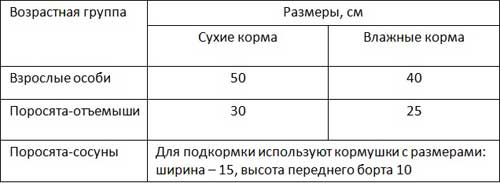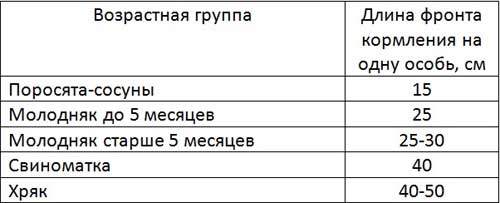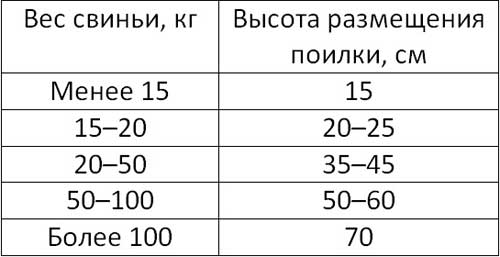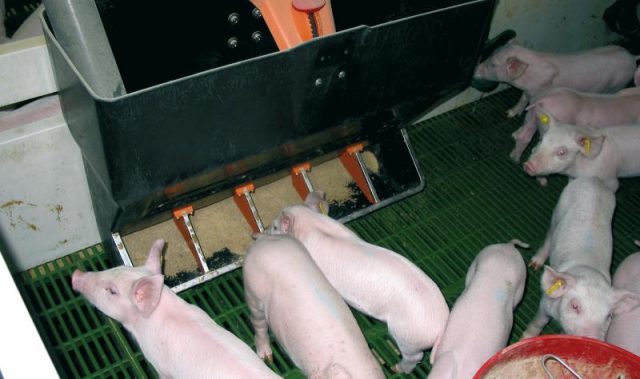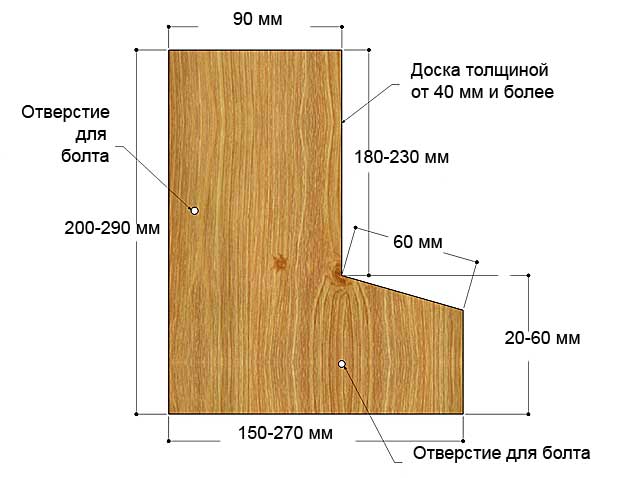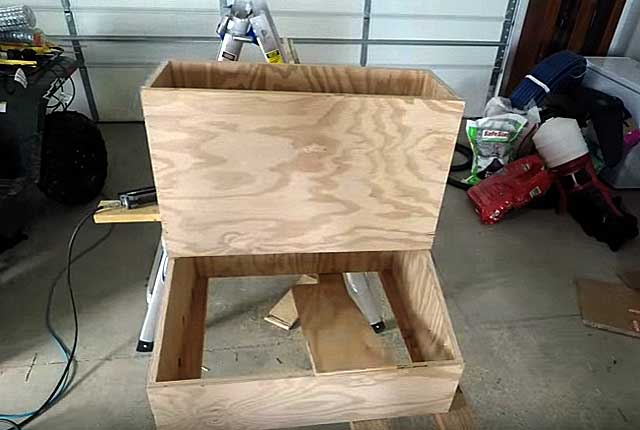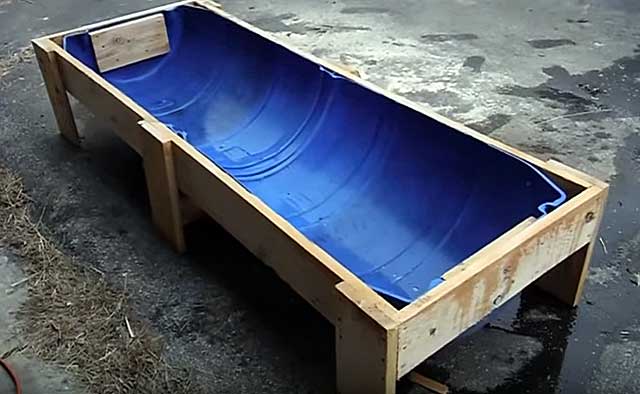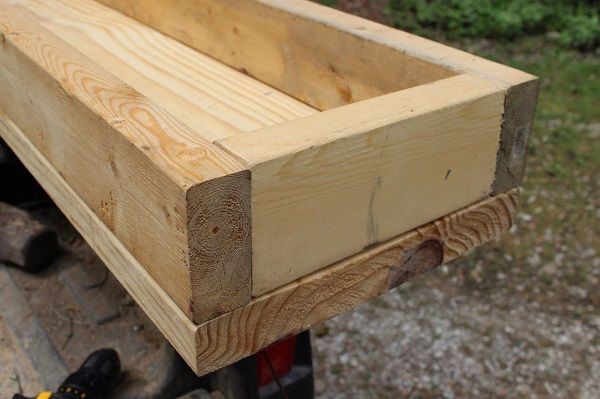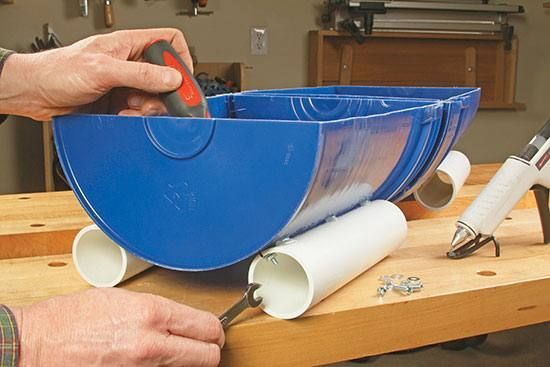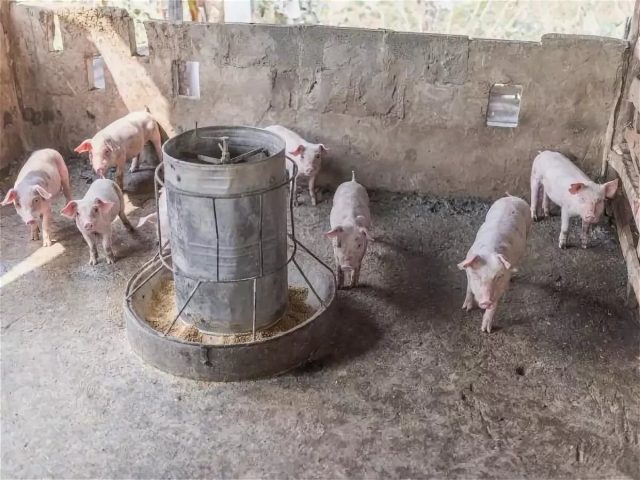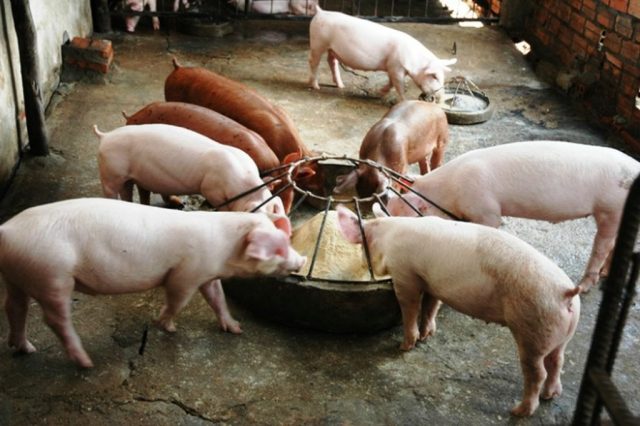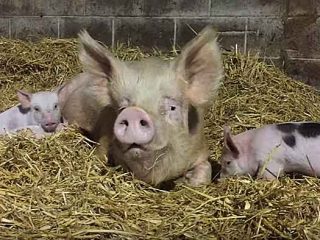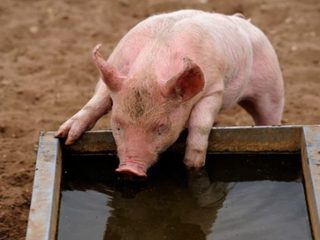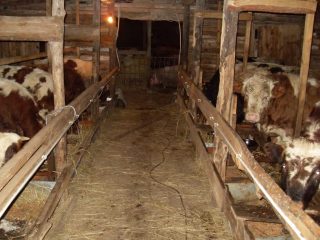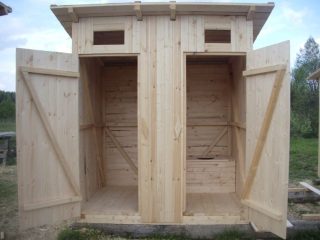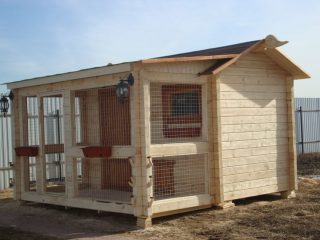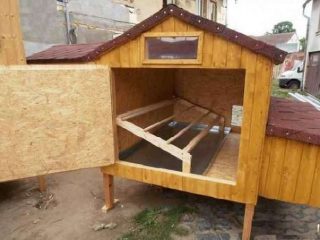Content
- 1 General requirements for feeders for pigs and piglets
- 2 Feeder types
- 3 How to make do-it-yourself pig feeders
- 4 DIY bunker feeder for pigs and piglets
- 5 How to make a plastic barrel pig feeder
- 6 How to make a pig trough from a gas cylinder
- 7 Piglet and pig feeders from pipes
- 8 How to make a wooden trough for pigs and piglets with your own hands
- 9 Installing feeders in a pigsty
- 10 Original ideas for pig feeders with photos
- 11 Conclusion
Pig feeders in a simple design are a spacious container with compartments for each head. Bunker-type models are considered improved, allowing for automatic feeding. It is not difficult for pigs to build any feeder on their own, which the owners of the household successfully do.
General requirements for feeders for pigs and piglets
Before making and installing a feeder in a pigsty, you must familiarize yourself with a number of sanitary requirements:
- The place of installation in the pigsty is chosen accessible so that it is convenient to fill the pigs with feed, to clean from residues, and to carry out washing.
- The trough is provided with a secure fixation. Pigs should not turn it over, deform with blows.
- The feeder is equipped so that pig excrement does not get inside. Organic waste contains parasite larvae that cause dangerous diseases.
- Separate containers are placed for the pigs for dry, liquid and water feed.
- Leaky troughs are unacceptable to use. Liquid feed flows through the cracks, humidity rises inside the pigsty, and unsanitary conditions arise.
- For each age of pigs, troughs with the appropriate side height are selected. Observe the angle of inclination so that the feed flows to the front wall.
Small pigs are born weighing about 1 kg. Subject to the diet, individuals of good breeds at the age of six months are able to gain weight up to 100 kg. The mass of a breeding boar or sow reaches 300 kg. Along with gaining weight, the dimensions of the pigs, in particular the head, increase. To make it more convenient for the animal to get food, a certain trough length is allocated for each age:
- milk baby - 15 cm;
- young animals up to 3 months old - 20 cm;
- individuals aged 6 months, left for fattening - 25 cm;
- age category of pigs from 7 to 10 months - up to 35 cm;
- sow feeder length - up to 40 cm;
- breeding boar - from 40 to 50 cm.
The height of the sides of the trough for dairy babies is made up to 10 cm high.The parameter for adult pigs is in the range of 15-25 cm.
Feeder types
Conventionally, all existing feeders are divided into two groups.
By way of use:
- stationary models for pigs are securely fixed, do not lend themselves to movement;
- mobile models are in demand in large farms for uniform feeding of the herd;
- individual models are placed inside the box for one animal, for example, a sow;
- group models are designed to feed several pigs at the same time.
By device:
- ordinary feeders are made in the form of a simple trough, and sometimes pigs use any container at hand;
- bunker feeders for pigs are more complicated, but they allow automatic feeding.
Feeders differ in size. They are narrow, wide, shallow and deep, with or without dividers. When making a do-it-yourself piglet feeder, photo tables with dimensions will help you build an optimal design.
Width parameter table:
Length parameter table:
Drinker parameters table:
The video will help you make a do-it-yourself pig feeder according to all the rules:
How to make do-it-yourself pig feeders
The trough manufacturing process is simple. But the automatic pig feeder is more complicated. Here you need drawings with exact dimensions.
What materials are suitable for manufacturing
The most popular materials are metal and wood. Each of them has its own pros and cons. Ferrous metal quickly rusts and rots in dampness. It is optimal to use stainless steel, but the design will cost more. Wooden troughs are knocked out of a 40 mm thick board. Natural material is environmentally friendly, but pigs gnaw on it. Food debris eats into the tree, bacteria multiply.
DIY bunker feeder for pigs and piglets
Compared to a trough, making a hopper hopper feeder is much more difficult, but it has a big advantage. The design consists of a spacious hopper for filling feed. Its lower part with a slot is directed into the tray. A certain portion of the feed is emptied from the hopper. When the pigs eat it, a new portion is automatically fed into the tray.
Another advantage is the uniform feed flow. Pigs receive a certain amount of food. They eat it completely, and nothing is left to spread or contaminate. The presence of a spacious bunker allows you to make large supplies of food.
Making an auto feeder for pigs with your own hands is beneficial if the farm contains at least 5 heads. However, sometimes the structure is used when feeding 2-3 animals. It is optimal to choose metal as the material of manufacture, but if there is no experience in welding, wood is used.
When assembling a hopper feeder for pigs with your own hands, it is advisable to have drawings on hand. In fact, you need a diagram of one side shelf. The second item is an exact copy. The shelves are interconnected by rectangular fragments. As a result, two containers are formed: a tray and a hopper. The photo shows the dimensions, but they can be changed depending on the age of the pigs for which the auto feeder is intended.
To make a metal structure, pigs will need a stainless steel about 3 mm thick, a grinder and a welding machine. The manufacturing process consists of several steps:
- Drawings are transferred to a sheet of metal. Fragments of blanks are cut out with a grinder.
- The parts are welded into a single structure. A sheet is welded to the bottom of the hopper at an angle. The device forms a gap from where dry food will be fed into the tray.
- A limiting bar is installed near the slot of the hopper.
- The bottom of the tray is welded with a rectangular plate to form a container for food.
The structure is sanded, removing sharp burrs, scale. Be sure to weld the fasteners so that the pigs do not overturn the feeder.
A wooden analogue of an auto-feeder for pigs is assembled according to a similar principle, only self-tapping screws are used for connection. The elements of the body are cut out of multilayer moisture-resistant plywood with a jigsaw. To strengthen the connection, bars are placed at the joints. The elements are pulled together with self-tapping screws. If the automatic feeder for pigs is supposed to be placed on the street, the top of the hopper is equipped with a hinged lid. Fasten it with furniture hinges.
The plywood feeder is suitable for small pigs. Big pigs will break it easily. For adults, it is optimal to take boards with a thickness of about 40 mm with the material of manufacture.
How to make a plastic barrel pig feeder
Used plastic barrels are great for feeding pigs. The only requirement is that you cannot use containers where pesticides used to be. The advantage of plastic is corrosion resistance. The containers are well washed, but they are gnawed by pigs, which is the only drawback.
For small piglets, a trough can be made simply by cutting out windows on the side of the barrel. The strips left will play the role of dividing jumpers. The barrel is securely fixed to the floor so that it does not roll over.
It is optimal to build a piglet feeder with a wooden frame with your own hands. Adult pigs will not gnaw it quickly. The plastic barrel is cut lengthwise into two parts with a grinder. The framing is hammered from boards 40 mm thick. The halves of the barrels are inserted inside the frame.
If it is supposed to breed young animals, then it is optimal to dissolve the barrel into two unequal parts. The larger half will go to the big pigs, and the smaller half will make the trough for the little ones.
How to make a pig trough from a gas cylinder
A trough for pigs from a gas cylinder is made according to a similar principle, only the container must first be properly prepared. The first step is to make sure that there is no gas by opening the valve. Condensation with a pungent odor may remain inside. The liquid is drained through an open valve by inverting the bottle. Disposal is carried out away from residential buildings.
The cylinder valve is unscrewed or cut down with a grinder. Water is poured inside, shaken thoroughly to remove condensate residues, poured into the designated place. The cylinder is cut along the grinder in two halves. The workpieces are burned with fire, washed from soot. To make the pig trough shown in the photo with your own hands, the two halves are welded together with rods. Legs are welded to the bottom from the outside. If the trough of the two halves is too large for the pigs, use one part of the cylinder.
Piglet and pig feeders from pipes
If the farm has a piece of asbestos-cement or ceramic pipe with a diameter of at least 200 mm, pigs will get a good stationary trough from it. First, a workpiece of the required length is cut off with a grinder. The next step is to dissolve the pipe lengthwise into a smaller and larger part. The first element is discarded. Most of the pipe will go to the trough for the pigs.
The base of the trough is poured into a concrete pigsty. A pipe is placed in the solution, the sides are closed with plugs. It is optimal to adapt the fitting on one side through which the liquid will be drained during the washing of the trough. Separating jumpers for each pig are installed from reinforcement with a thickness of 15 mm.
How to make a wooden trough for pigs and piglets with your own hands
The advantage of the wooden pig trough is that it is easy to assemble. In addition, wood tends to swell, which leads to tightening of all cracks. Even liquid food can be fed to pigs in a wooden trough. The photo shows a detailed drawing. The sizes are selected according to the age of the pigs. The parameters are shown in the table above. From the tool for work you will need a saw, jigsaw, screwdriver, hammer.
Manufacturing begins with cutting out fragments from a 40 mm thick board. If the trough is permanently fixed near the wall of the pigsty, then the tailgate is made higher from the front to prevent feed from entering the trough. When it is assumed that the pigs will approach from both sides, then the height of both sides is made the same.
The cut blanks are folded into a single structure, pulled together with self-tapping screws. Sharp edges are processed with sandpaper, deburrs are removed so that the pigs do not get hurt. The working part of the trough is divided by jumpers made of polished bars with a section of 40x40 mm.
Installing feeders in a pigsty
There are several options for the location of the feeders:
- troughs are installed permanently for pigs;
- for a two-way approach of pigs in a large herd, mobile structures are arranged;
- when keeping pigs in the boxing up to three heads, equip a separate location of the feed dispenser;
- it is customary for a large number of pigs to set aside a place for group feeders.
The place of installation is chosen at the stage of construction of the pigsty. It is desirable to separate the pig feed unit so that it is less exposed to contamination. The trough is installed at an arbitrary slight slope. The feed will move to one edge.
Original ideas for pig feeders with photos
In the household, pig troughs are made of anything that can be adapted. Metal containers are considered the best option due to their long service life. Small piglets cut out troughs from buckets, plastic bottles, car tires. The do-it-yourself pig feeders shown in the photo are distinguished by their originality, and every person can make them in a couple of hours.
Conclusion
Feeders for pigs should be convenient for the animal and the owner to perform maintenance. If all the requirements are met, the piglets eat well, gain weight faster.

